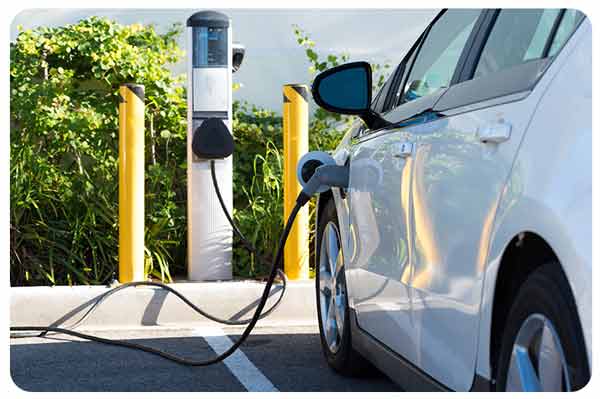What is an electric vehicle (EV)?
![White car parked at charging station]()
An electric car is a vehicle that uses electric power instead of gas to propel itself. Also called battery electric vehicles (BEVs), they operate solely using an electric motor and battery, creating zero emissions. You charge the engine using a wall outlet that can be installed in your home or at a public charging station. EVs are fully electric and use no gas engine components, unlike hybrids, which use a combination of electricity and gas to power the vehicle.
Electric vehicles have only been in mass production since 1997, when Toyota introduced the Prius. However, the popularity of Tesla and other models has significantly increased the number of electric vehicles on the road today.
According to the EV buyers guide , there are over 150 EV models available from 28 manufacturers. These models can come with up to 7 seats. They can have all (AWD), front (FWD), or rear wheel drive (RWD), and prices range from $38,000 to $185,000.
What is electric vehicle car insurance?
Electric vehicle car insurance is coverage designed for vehicles that run on electricity over gas.
While the majority of coverage is similar to standard car insurance in Ontario, there are some subtleties to note. For example, you may require additional liability coverage for situations unique to electric vehicles – charging cables, charging stations, and EV battery protection.
If you install a charging station at home, you will also need to update your home insurance policy to include the charging station equipment.
How does electric vehicle auto insurance work?
Insurance for electric cars works the same as other normal policies. You are required to have insurance coverage to drive. You need a minimum of $200,000 in third-party liability. Mandatory coverage also includes accident benefits, direct compensation property damage (DCPD), and uninsured automobile coverage. There is also additional coverage for battery protection and home charging stations.
Drivers can increase their coverage and plan limits. This allows you to customize your policy. It’s common to add comprehensive or collision coverage. Speak with your insurer about coverage requirements specifically for electric cars.
EV insurance policies can differ from standard coverage because they offer electric vehicle specific coverage. For example, policies include coverage options for the electric parts of the vehicle, such as batteries and charging equipment. They may also cover perils related to the battery, such as defects or fire damage from a faulty battery. Speak with your insurer about coverage requirements specifically for electric cars so you can choose a policy that meets your unique driving needs.

















